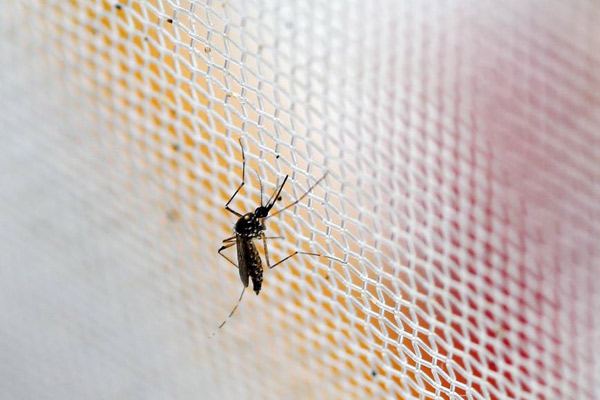Mosquitoes to be used in the fight against Zika
Updated: 2016-02-05 08:04
By Shan Juan(China Daily)
|
|||||||||||
 |
|
A mosquito is seen in the Gorgas Memorial institute for Health Studies laboratory in Panama City, Feb 4, 2016. [Photo/Agencies] |
A pilot field study using mosquitoes infected with bacteria is expected to be launched in South China probably in March, according to a lead researcher.
The move is aimed at reducing the local mosquito population, which could pass the Zika virus to humans, said Xi Zhiyong, who heads the study.
Xi is a microbiology professor at Sun Yat-sen University in Guangzhou, Guangdong province.
Millions of laboratory-produced Aedes aegypti mosquitoes infected with the Wolbachia bacteria will be released at two or three trial sites in Guangdong.
Last year, the team lowered the mosquito population by 90 percent during a trial using the same method and helped to contain a local outbreak of dengue fever. Both dengue and Zika are viruses spread by the Aedes aegypti mosquito.
Xi said the researchers only release male mosquitoes, which don't bite. The eggs produced by females mating with Wolbachia-infected males are infertile, which leads to reduced mosquito populations.
The Zika virus, which has been linked to severe birth defects in thousands of babies in Brazil, is spreading rapidly in the Americas.
The US has reported a sexually transmitted Zika case, but the World Health Organization has said more investigations are needed to verify this.
No Zika cases have been reported in China to date. On Thursday, the National Health and Family Planning Commission ordered the mass extermination of mosquitoes.
Xi said the team is working on ways to produce more Wolbachia-infected mosquitoes and is considering drones to help release them in March.
The WHO has recommended studies of genetically engineered mosquitoes and those infected with bacteria to help with reduction efforts.
Xi said the genes of Wolbachia-infected mosquitoes are intact and the mosquitoes are safer for the ecological environment and other species, including humans.
But he said more field studies are needed to evaluate this method before it is used in other parts of China to control and prevent the Zika virus.
Guo Yuhong, a researcher at the Chinese Center for Disease Control and Prevention's Infectious Disease Institute, said Aedes aegypti mosquitoes can be found widely in South China and some northern areas of the country.
But she remains cautious about the Wolbachia-infected mosquitoes and feels that more investigations are required.
"They work in theory, but we are not sure about the potential impact that extinction of Aedes aegypti mosquitoes would have on the ecosystem," she said.
Related Stories
US confirms first sexually transmitted Zika case 2016-02-04 07:47
Zika curbs to include mosquito mass extermination 2016-02-04 07:44
Honduras declares national emergency over Zika virus 2016-02-03 17:00
Mainland Chile confirms first 3 cases of Zika virus 2016-02-03 09:18
WHO declares Zika virus 'extraordinary' emergency 2016-02-03 08:18
Today's Top News
Changan Automotive consolidates UK operations
Chinese students in UK enjoy fruits of the 'golden era'
Chopsticks shop draws all kinds
Foreign companies bet on China's consumers
Cruz bests Trump in Iowa, Clinton and Sanders tie
PLA revamps command system
China manufacturing activity contracts for 6th month
Sanders plays down Clinton's hold over voters in Iowa
Hot Topics
Lunar probe , China growth forecasts, Emission rules get tougher, China seen through 'colored lens', International board,
Editor's Picks

|

|

|

|

|

|






